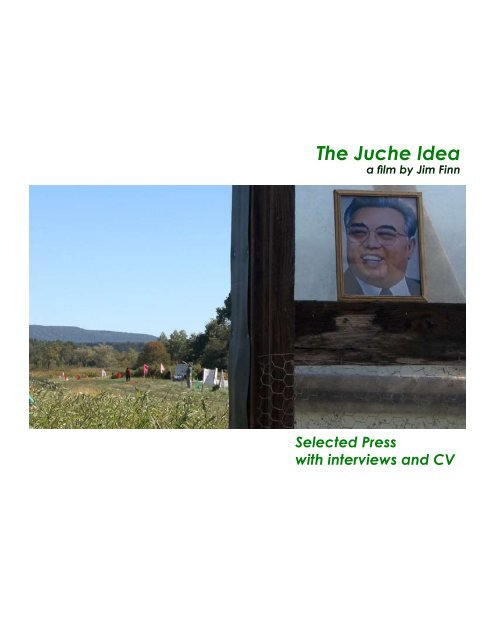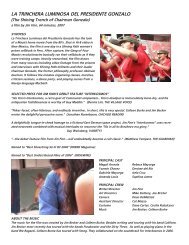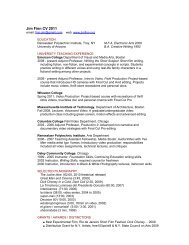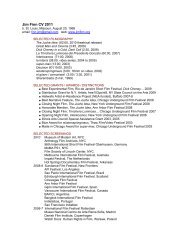The Juche Idea - Jim Finn
The Juche Idea - Jim Finn
The Juche Idea - Jim Finn
Create successful ePaper yourself
Turn your PDF publications into a flip-book with our unique Google optimized e-Paper software.
<strong>The</strong> <strong>Juche</strong> <strong>Idea</strong><br />
a film by <strong>Jim</strong> <strong>Finn</strong><br />
Selected Press<br />
with interviews and CV
THE JUCHE IDEA<br />
<strong>Jim</strong> <strong>Finn</strong>, 62 min, 2008<br />
SYNOPSIS<br />
In the late 1960’s Kim Jong Il guaranteed his<br />
succession as the Dear Leader of North Korea by<br />
adapting his father’s <strong>Juche</strong> (pronounced choo-<br />
CHAY) philosophy to propaganda, film and art.<br />
Translated as self-reliance, <strong>Juche</strong> is a hybrid of<br />
Confucian and authoritarian Stalinist pseudosocialism.<br />
<strong>The</strong> film is about a South Korean<br />
video artist who comes to a North Korean art<br />
residency to help bring <strong>Juche</strong> cinema into the<br />
21st century. Inspired by the real-life story of<br />
the South Korean director kidnapped in the 70’s<br />
to invigorate the North Korean film industry, the film follows Yoon Jung Lee, a young video artist invited to work at a<br />
<strong>Juche</strong> art residency on a North Korean collective farm. <strong>The</strong> story is told through the films she made at the residency as<br />
well as interviews with a Bulgarian filmmaker and even a brief sci-fi movie.<br />
SELECTED PRESS for THE JUCHE IDEA (2008)<br />
VARIETY: “<strong>The</strong> evidence that current filmmaking is brimming with original, standard-breaking<br />
creations has to include the work of <strong>Jim</strong> <strong>Finn</strong>, whose brilliant ‘<strong>The</strong> <strong>Juche</strong> <strong>Idea</strong>’ is the latest in a<br />
growing filmography without precedent or category... ‘<strong>The</strong> <strong>Juche</strong> <strong>Idea</strong>’ effectively completes a<br />
trilogy of ultra-compact features that boldly upturn notions of documentary and fiction,<br />
propaganda thought, reality and restaging, and even what an “experimental film” actually is. To say<br />
that these films open up new possibilities for satire, ideas and language isn’t an overstatement.”<br />
“<br />
INDIEWIRE: “...a hilarious exploration of North Korean perspectives on artistic expression... has the<br />
kind of outsider perspective that avant-garde film lovers will find delectable.”<br />
“<br />
SAN FRANCISCO BAY GUARDIAN “...Both capitalism and socialism are skewered with no mercy and<br />
maximum mirth by <strong>Jim</strong> <strong>Finn</strong>’s <strong>The</strong> <strong>Juche</strong> <strong>Idea</strong>, which takes the published film theories of none other<br />
than Kim Jong-Il as its point of entry…... This world — where shoveling duck dung together makes for<br />
a romantic first date — looks like North Korea, one has to guess, or at least “Dear Leader’s” ideal version.<br />
Still, reviewers who assume capitalism emerges unscathed from the uproarious <strong>Juche</strong> <strong>Idea</strong> are<br />
watching the movie with one eye closed. <strong>Finn</strong> spotlights hilarious propagandistic turns of phrase<br />
such as “the tiny dentures of imperialism.” But with one capitalist land outside the movie screen<br />
saddled with a 700 billion dollar debt, a viewer is left to wonder who’s zooming who when passing<br />
through the film’s multi-faceted looking glass….<br />
ABOUT THE DIRECTOR<br />
“<strong>Jim</strong> <strong>Finn</strong> has made a name for himself...thanks to his feeling for irony and his<br />
capacity to shape something new from propaganda, news and other historic<br />
images. Not to forget his very dry sense of humour.” (Rotterdam International<br />
Film Festival)<br />
<strong>Jim</strong> <strong>Finn</strong> (b. St. Louis, 1968) uses humor and historical fiction to examine ideology,<br />
capitalism and revolutionary art practices. His work has screened at international<br />
festivals like Rotterdam, Sundance and Edinburgh as well as museums and<br />
cinematheques such as the Museo Reina Sofia in Madrid, the Danish Film Institute<br />
and the Harvard Film Archive. His latest work is a trilogy of feature-length films<br />
looking at Marxist ideology. <strong>The</strong> first of these, Interkosmos, was called “a retro<br />
gust of communist utopianism” by the Village Voice and “charming and fantastic,<br />
so full of rare atmospheres” by Canadian filmmaker Guy Maddin. His second feature<br />
La Trinchera Luminosa del Presidente Gonzalo was put on the Village Voice’s<br />
Top 10 Year in Experimental Film. And Variety called <strong>The</strong> <strong>Juche</strong> <strong>Idea</strong> “brilliant”<br />
and said all three films “upturn notions of documentary and fiction, propaganda<br />
thought, reality and restaging, and even what an ‘experimental film’ actually is.”<br />
PRINCIPAL CAST<br />
BEST NARRATIVE FILM<br />
CHICAGO<br />
UNDERGROUND<br />
FILM FESTIVAL<br />
2008<br />
HONORABLE MENTION<br />
ANN ARBOR<br />
FILM FESTIVAL<br />
2008<br />
OFFICIAL SELECTION<br />
AFI<br />
FILM FESTIVAL<br />
2008<br />
BUENOS AIRES<br />
INTERNATIONAL<br />
FESTIVAL OF<br />
INDEPENDENT FILM<br />
2008<br />
CLOSING NIGHT FILM<br />
NEW YORK<br />
UNDERGROUND<br />
FILM FESTIVAL<br />
2008<br />
OFFICIAL SELECTION<br />
EDINBURGH<br />
INTERNATIONAL<br />
FILM FESTIVAL<br />
2008<br />
Jung Yoon Lee Daniela Kostova<br />
Kim Sung Oleg Mavromatti<br />
PRINCIPAL CREW<br />
Writer/Director <strong>Jim</strong> <strong>Finn</strong><br />
Art Directors Jung Yoon Lee<br />
Daniela Kostova<br />
Music Pauline Oliveros<br />
Neung Phak<br />
Sound Design Jesse Stiles<br />
CONTACT<br />
finn.jim@gmail.com www.jimfinn.org
Cahiers du Cinéma Spain interview translation<br />
Interkosmos (2006), La Trinchera Lluminosa del Presidente Gonzalo (2007) and <strong>The</strong> <strong>Juche</strong> <strong>Idea</strong> (2008) form a trilogy with<br />
various points of view (always in the form of a fake documentary) about left-wing politics in the world. Was it planned as a<br />
trilogy from the origin?<br />
No. Interkosmos was originally going to be a 12-minute sequel to wüstenspringmaus, my short film about the<br />
history of the gerbil and the history of capitalism. Basically the idea that the guinea pig is a communist animal since it is<br />
so gentle and its only defense is in numbers. But I started developing this idea of a people’s carnival colony in space and<br />
then I needed humans and then a space capsule and so for two years I worked on Interkosmos until it became my first<br />
feature film. La Trinchera Luminosa del Presidente Gonzalo was in some ways a reaction to Interkosmos. I wanted to<br />
make something more serious in a way. And with the success of Interkosmos I was getting all kinds of advice about what<br />
kind of film to make and how to work with a producer. I had been interested in the seeming contradiction between the<br />
extreme violence and authoritarian qualities of the Shining Path and the fact that it had the highest proportion of women<br />
commanders of any Latin American guerrilla group in history. Shooting a kind of found video of that group made the most<br />
sense to me. For <strong>The</strong> <strong>Juche</strong> <strong>Idea</strong>, I was drawn to the subject by the visual splendor of the Mass Games and then I started<br />
researching the role of propaganda in the country and Kim Jong Il’s film theories and I was hooked. In all three I created<br />
films made ostensibly by other people in other languages but all three look back at my culture and the role of imperialism<br />
is maintaining our hegemony in the world. I had in mind a fictional editor for each of the films who was making a kind of<br />
failed propaganda film.<br />
In all of them we foresee a very singular and ironic approach (even sarcastic) towards the reality that is being showed. Is it<br />
humor the best political arm and the most eficcient dispositive of denunciation?<br />
I use irony to examine communist documentary techniques and to expose the role of media as propaganda in<br />
general. Following up on the last question, my films can be read on a couple levels. I am influenced by filmmakers who<br />
had to squeeze their ideas into genre films like Douglas Sirk or Val Lewton and ones like Ernst Lubitsch who could make<br />
fun of Stalinism while offering up a great communist character (Garbo in Ninotchka). I just felt that I could leave off the<br />
final judgment of who’s right and wrong. You can get that on Wikipedia. I don’t really feel like I am denouncing communist<br />
authoritarianism, but rather examining the elements that appeal to me and that repel me. Humor lets you get away with<br />
things that you cannot in a serious film, but it is a delicate thing because you easily just go into an overt satire or a mockumentary.<br />
I am using the structure of a false documentary to create a fiction in a way that novelists use letters to create a<br />
realistic drama. My favorite film is probably Buñuel’s Simon of the Desert, which is very funny but also a very sympathetic<br />
portrait of a mad monk. It’s only 45 minutes long because he ran out of money making it. So inspiring.<br />
<strong>The</strong> films are very “stylized”, almost coreografiated, which in a sense makes them very different from other vanguardist<br />
forms on political issues, maybe related to rawness. Could you comment on this?<br />
It’s important for me to actually make the films. So many amazing films are living in people’s heads, and I need<br />
to get mine out into the world. <strong>The</strong> advantage of living in the U.S. is that there is lots of work to fund projects and lots of<br />
other artists and equipment willing to support each other. <strong>The</strong> disadvantage is that there is very little state funding for<br />
experimental film. So I have to get them made any way I can, which makes them a bit raw. <strong>The</strong> stylized part to a certain<br />
degree goes back to my desire to be an artist working within a 1940’s studio system. I make up genre rules and then try to<br />
fit my films within those rules. So in La Trinchera Luminosa, I felt like I could only film things that would be allowed by the<br />
Maoists. Same with <strong>The</strong> <strong>Juche</strong> <strong>Idea</strong> and Kim Jong Il. And Interkosmos and East Germany. In other words, the films on the<br />
one hand exist as a kind of propaganda but also as a subversion of propaganda simultaneously. Most heavy political films<br />
don’t want to do that because they don’t want the audience to be confused about their purpose or their thesis. Or they are<br />
afraid they come off as nihilists. I don’t really see myself as a “pox on both their houses” character. I am a filmmaker with<br />
left-spectrum politics making films about the Left.<br />
<strong>The</strong>re’s the perception in your films of a special attraction for the utopies that so hard were persecuted during the sixties and seventies.<br />
In which sense we must understand nowadays the rising of these utopic ideas?<br />
Lately I have been interested in radical Catholicism. Figures like Dorothy Day, a former communist who founded the Catholic<br />
Worker movement in the U.S., and Camilo Torres, the guerrilla priest of Colombia. I have basically put my art career on hold for<br />
the last month to try and help Obama get elected by going to swing states, organizing students and running an election blog. It’s not<br />
only that I am terrified of McCain-Palin and the white supremacist backlash they are trying to incite, but also I feel like this guy can<br />
give us some breathing room to get basic rights like universal health care that have been denied us. I know there is a lot of Wall Street<br />
money, and he is a barely on the Left. But in the U.S., a centrist as President is a radical idea. <strong>The</strong> most common utopian ideas now<br />
at play in the U.S. are really the free market and neoconservative utopian ideals. <strong>The</strong>se right-wing Trotskyites are going to get us all<br />
killed.<br />
In your works there’s an interelation or contamination between what is assumed within the specific filming dimension (to be seen in<br />
theaters) and what is more asociated with other kind of artistic expressions (to be seen in museums). How do you, in creative and<br />
exhibitional terms, understand the relatioinship between both spaces?
I prefer the theater setting because I want people to sit and watch the movie. My films have to be seen in their<br />
entirety. If you see parts of them, then you can say they are jokes. Other parts and they are re-enactments. Though funny,<br />
my movies do not really play well to mainstream audiences because they challenge the basic rules of narrative filmmaking.<br />
But then experimental audiences are often suspect of humor because they feel that you might be pandering to the<br />
audience. A museum environment works best when they show a lot of my work or show in a curated context. I do not like<br />
the gallery setting where people can walk in and out. I have agreed to do that a couple times and generally regret it. I do<br />
have an interest in my work being seen by the largest audience possible though.<br />
<strong>The</strong> formal rupture of your films (in a narrative and esthetical way), are the result of exploring non-articulated speechs that<br />
could bring up new ways of reflecting on politics? Is it maybe based on a notion of creativity related with the principles of a<br />
fructiferous anarchy?<br />
To a certain degree all three films are about ideology and art-making. So how do you talk about either of those<br />
fairly dry subjects in a new or interesting way? I wanted to create characters and were resolute and creative. So I have an<br />
cosmonaut speaking about capitalism as a “kindergarten of boneless children” or a guerrilla who when pressed about the<br />
extreme violence says, “If you hear a baby crying and walk in the room to see rats chewing on its fingers, is it wrong to kill<br />
the rats?” I love characters like this—who maintain their revolutionary ideals even when it’s obvious to everyone else that<br />
things aren’t going so well. To place these characters in a normal melodrama or even a kind of character-based independent<br />
film seems counter-revolutionary to me. I think these characters exist best in this kind of film—in a film that subverts<br />
the idea of realism with a fiction that hits closer to the truth than a typical documentary or narrative film.<br />
Extracted from comunism strategies, your films uses its iconography, the lampoon elements, the indoctrination, fanatism<br />
and inflexibility. Extrems that are taken to absurd by the means of humor. Is it a way of expressing the contradictions of<br />
any political regimen?<br />
I think it’s important that the films are about communist movements. I have an ambiguous relationship with communism.<br />
On the one hand, I reject the non-democratic authoritarianism of the so-called vanguard. On the other hand,<br />
it seems like the Left is always getting its ass kicked. It’s always the loser. So there’s something really refreshing about<br />
places like Cuba or to a much greater extreme in North Korea. Or movements like Sendero Luminoso that basically ignore<br />
reality and claim to be on the right side of history. <strong>The</strong>y see themselves as monasteries in the Dark Ages to a certain degree.<br />
As keepers of the flame. As someone raised Catholic that has an appeal. Also, I share a lot of their basic critique of<br />
capitalism even if I don’t share their solutions. So in a sense there is a kind of self-criticism in making films like this.<br />
Your work proposes a kind of reflection that, in general, is not very common in American film production. Which is the<br />
audience reaction? How are these films accepted in a general way?<br />
In Interkosmos the German rendition of Judy Garland’s Trolley Song always goes over really well. And Oleg the<br />
Russian Stalinist tourist in <strong>The</strong> <strong>Juche</strong> <strong>Idea</strong> is a bit hit as well. I think the U.S. audiences have responded best to those two<br />
films since they flirt with communist kitsch and have pretty strong comedic parts. La Trinchera Luminosa del Presidente<br />
Gonzalo is a harder sell here. It’s pretty dense and the humor is not as overt. But the three films have never been seen in<br />
the U.S. as part of a series or retrospective the way they were in Buenos Aires or will be in Gijón next month. I think that<br />
will change the way they are perceived since they all really deal with the process of making film and shaping propaganda<br />
and history in a way that is universal.<br />
Could you comment on the importance of music in your films? How do you approach the use of music in them?<br />
All my films reference the history of film and specifically the really grandiose 30’s Warner Bros. musicals. That<br />
kind of pageantry never really went out of fashion in Stalinist states and I can appreciate that. <strong>The</strong> whole idea of something<br />
going out of fashion is really a capitalist idea so that people consume new items to make the economy grow and<br />
expand. I wanted to take musical numbers and sports references and make them revolutionary in my films. All three films<br />
have a structure similar to a musical production where there is a dance or song every 8-10 minutes. I’m just too broke to<br />
have all big choreographed dance numbers, so I have to fake it with space capsule arm exercises, soccer games and Kim<br />
Jong Il inspecting 16mm film cameras to music.<br />
Do you have any special relation with colleagues from your generation? In a sense, do you conceive your work also as<br />
part of a movement, a group, a big idea?<br />
If I came out of a film movement, it was underground short films in the late 90’s to 2005. I went on two national<br />
tours with my short films in 2003 and 2005 to art theaters, microcinemas and galleries. I started making movies in Chicago<br />
and lots of my friends were visual artists or musicians so I always saw myself as part of a larger Do-It-Yourself (DIY)<br />
political art scene. I never really had a lot of patience for extremely formal experimental work or apolitical gag comedy<br />
stuff. I felt like I wanted to make political films but in a totally different way. I recently just wrote an article for the Canadian<br />
film magazine Cinemascope that talks about these short experimental festivals in the U.S., some of which are no longer<br />
around. Lots of the media artists screening in the last ten years—and especially in the Bush years—feel the responsibility<br />
to expose power while challenging the basic structures of film and video making. Essentially to take on the corporatepolitical<br />
system but not play by their rules of conventionally constructed narratives. If there is a big idea, I guess that’s it.
<strong>Jim</strong> <strong>Finn</strong><br />
www.jimfinn.org contact: finn.jim@gmail.com 1913 5 th Ave. Troy, NY 12180 ph: 773.531.4988<br />
.<br />
SELECTED FILMOGRAPHY<br />
Great Man And Cinema (2.5 min, 2009)<br />
<strong>The</strong> <strong>Juche</strong> <strong>Idea</strong> (62 min, 2008)<br />
La Trinchera Luminosa del Presidente Gonzalo (60 min, 2007)<br />
Interkosmos (71 min, 2006)<br />
la lotería (video series, 2004 to 2005)<br />
super-max (13 min, 2003)<br />
Decision 80 (10 min, 2003)<br />
wüstenspringmaus (3 min, 16mm on video, 2002)<br />
el güero / comunista! (3 min / 3.5 min, 2001)<br />
sharambaba (3 min, 1999)<br />
GRANTS / AWARDS / DISTINCTIONS<br />
• Best Narrative Feature, <strong>The</strong> <strong>Juche</strong> <strong>Idea</strong>, Chicago Underground Film Festival 2008<br />
• Featured in upcoming Phaidon Press book 10 x 10 Film Directors, a survey of 100 innovative film directors from<br />
around the world (2009)<br />
• Retrospective, Gijón International Film Festival (2008)<br />
• Retrospective, Buenos Aires International Festival of Independent Film (2008)<br />
• Closing Night Film, <strong>The</strong> <strong>Juche</strong> <strong>Idea</strong>, New York Underground Film Festival (2008)<br />
• Honorable Mention, <strong>The</strong> <strong>Juche</strong> <strong>Idea</strong>, Ann Arbor Film Festival (2008)<br />
• Hallwalls Artist-in-Residence (funded by the National Endowment for the Arts), Buffalo (2007-8)<br />
• Electronic Arts Teaching Assistantship/Full tuition scholarship, Rensselaer Polytechnic Institute, Troy, NY (2006-8)<br />
• BioArt Initiative Resident, Center for Biotechnology and Interdisciplinary Studies, Rensselaer Polytechnic Institute<br />
(2007)<br />
• Closing Night Film, La Trinchera Luminosa, Chicago Underground Film Festival (2007)<br />
• Opening Night Film, Interkosmos, New York Underground Film Festival (2006)<br />
• Best of Aurora Picture Show, (2002, 2006)<br />
• Best of Peripheral Produce (2004)<br />
• Illinois Arts Council Special Assistance Grant (2003, 2005)<br />
• Chicago Underground Film Fund Grant (2004)<br />
• Blue Award for wüstenspringmaus, Thaw Film/Video Festival (2003)<br />
• Made in Chicago Award for super-max, Chicago Underground Film Festival (2003)<br />
• Black Maria Director’s and Program Staff’s Citation for Decision 80 (2004)<br />
• Community Arts Assistance Grant, City of Chicago (1998, 2001-3, 2005)<br />
SELECTED SCREENINGS<br />
2008-9<br />
Sundance Film Festival<br />
AFI Festival, Los Angeles<br />
Sao Paolo International Film Festival, Brazil<br />
Edinburgh International Film Festival, Scotland<br />
Buenos Aires International Independent Film Festival, Argentina<br />
Cinevegas Film Festival<br />
Ann Arbor Film Festival<br />
New Museum, New York City<br />
Vancouver International Film Festival, Canada<br />
Gijón International Film Festival, Spain<br />
San Francisco Indiefest<br />
New York Underground Film Festival<br />
Bangkok International Film Festival<br />
2006 to 2007<br />
International Film Festival Rotterdam<br />
Edinburgh International Film Festival<br />
Wexner Center for the Arts, Columbus, Ohio<br />
Museo Nacional Centro de Arte Reina Sofia, Madrid<br />
Danish Film Institute, Copenhagen
Watch Docs: Human Rights in Film, Warsaw, Poland<br />
Melbourne Cinematheque, Australia<br />
Chicago Underground Film Festival<br />
Harvard Film Archive, Boston<br />
George Eastman House, Rochester, New York<br />
New York Underground Film Festival<br />
Cinematheque Leipzig, Germany<br />
2004 to 2005<br />
Ann Arbor Film Festival<br />
Cinematexas, Austin<br />
PDX Festival, Portland, Oregon<br />
Impakt, <strong>The</strong> Netherlands<br />
Wisconsin Film Festival, Madison<br />
New York Underground Film Festival<br />
Aurora Picture Show, Houston<br />
European Media Arts Festival, Osnabrück, Germany<br />
1999 to 2003<br />
Split International Film Festival, Croatia<br />
“Programa Metropolis”, Television Española<br />
Stuttgart Filmwinter, Germany<br />
Los Angeles Filmforum<br />
L.A. Freewaves Biennial<br />
Museo Tamayo de Arte Contemporaneo, Mexico City<br />
Videoex, Zurich<br />
“EGG the Arts,” PBS<br />
Thaw Film Festival, Iowa City<br />
Media City, Windsor, Ontario<br />
Cork International Film Festival<br />
Sydney Film Festival, Australia<br />
DISTRIBUTION<br />
• Facets Multimedia<br />
• Video Data Bank<br />
• Peripheral Produce<br />
SELECTED FILM/VIDEO WORK<br />
• Videographer for <strong>The</strong> Yes Men (2007), conservative think-tank interviews for upcoming feature film<br />
• Principal actor, Second Moon (2006), a feature film by Masahiro Sugano<br />
• Principal actor, Blind Spot, a feature film by Oleg Mavromati (2007)<br />
• Principal actor, Team (2003), a short film by Dean Rank<br />
CURATORIAL / TOURS<br />
• Southern Circuit Tour (2007). Southern Arts Federation sponsored tour of universities and screening venues in the<br />
Southeast.<br />
• <strong>Juche</strong> Film Series (2007). North Korean films with discussions.<br />
• Video Mundi festival (2003, 2004). Organizer of an experimental video festival bringing eight curators from around<br />
the world present free public programs at the Chicago Cultural Center<br />
• Monster Lotería Film Tour (2005). <strong>Jim</strong> <strong>Finn</strong> and Arthur Jones present their work in a U.S. and Canadian tour<br />
• Red State Craft Tour (2005) <strong>Jim</strong> <strong>Finn</strong> and Cat Mazza tour Southern craft fairs with their political crafts<br />
• Men and Animals Film Tour (Spring 2003). <strong>Jim</strong> <strong>Finn</strong> and Dean Rank present their work in a U.S. and Canadian tour.<br />
• Out of the Vault 16mm Festival at the Chicago Cultural Center (2001). A festival of various programs designed to<br />
save the library’s collection<br />
EDUCATION<br />
Rensselaer Polytechnic Institute, Troy, NY M.F.A. Electronic Arts 2008<br />
University of Arizona, Tucson B.A. Creative Writing 1992





